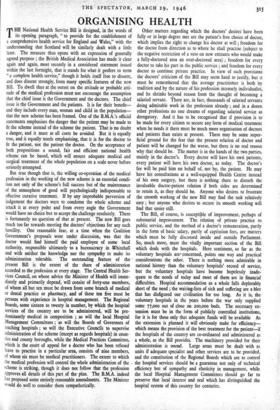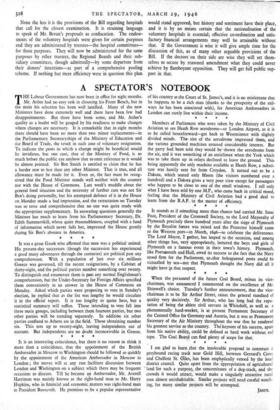ORGANISING HEALTH
THE National Health Service Bill is designed, in the words of its opening paragraph, " to provide for the establishment of a comprehensive health service for England and Wales," with the understanding that Scotland will be similarly dealt with a little later. The measure thus opens with an expression of generally agreed purpose ; the British Medical Association has made it clear again and again, most recently in a considered statement issued within the last fortnight, that it stands for what it prefers to term " a complete health service," though it holds itself free to dissent, and does dissent strongly, from many specific features of the new Bill. To dwell thus at the outset on the attitude or probable atti- tude of the medical profession must not encourage the assumption that the chief issue is the Government and the doctors. The chief issue is the Government and the patients. It is for their benefit— and they include every man, woman and child in the population— that the new scheme has been framed. One of the B.M.A.'s official statements emphasises the danger that the patient may be made to fit the scheme instead of the scheme the patient. That is no doubt a danger, and it must at all costs be avoided. But it is equally true, and it equally needs emphasising, that it is for the doctor to fit the patient, not the patient the doctor. On the acceptance of both propositions a sound, fair and efficient national health scheme can be based, which will ensure adequate medical and surgical treatment of the whole population on a scale never before seriously attempted.
But true though that is, the willing co-operation of the medical profession in the working of the new scheme is an essential condi- tion not only of the scheme's full success but of the maintenance of the atmosphere of good will psychologically indispensable to effective curative treatment. If by any improbable perversion of judgement the doctors were to condemn the whole scheme and attack it at every poiht and from every angle the Government would have no choice but to accept the challenge resolutely. There is fortunately no question of that at present. The new Bill goes much too far towards meeting the doctors' objections for any such hostility. One reasonable fear, at a time when the Coalition Government's proposals were under discussion, was that the doctor would find himself the paid employee of some local authority, responsible ultimately to a bureaucracy in Whitehall and with neither the knowledge nor the sympathy to make its administration tolerable. The outstanding feature of the present Bill is the extent of the share of administration accorded to the profession at every stage. The Central Health Ser- vices Council, on whose advice the Minister of Health will imme- diately and primarily depend, will consist of forty-one members, of whom all but ten must be drawn from some branch of medical or dental practice or pharmacy, and of these ten five must be persons with experience in hospital management. The Regional Boards, some sixteen to twenty in number, by which the hospital services of the country are to be administered, will be pre- dominantly medical in composition ; so will the local Hospital Management Committees ; so will the Boards of Governors of teaching hospitals ; so will the Executive Councils to supervise administration of the scheme (except as regards hospitals) in coun- ties and county boroughs, while the Medical Practices Committee, which is the court of appeal for a doctor who has been refused leave to practise in a particular area, consists of nine members, of whom six must be medical practitioners. The extent to which the medical profession will control the whole administration of the scheme is striking, though it does not follow that the profession approves all details of this part of the plan. The B.M.A. indeed has proposed some entirely reasonable amendments. The Minister would do well to consider them sympathetically. Other matters regarding which the doctors' desires have been fully or in large degree met are the patient's free choice of doctor, which implies the right to change his doctor at will ; freedom for the doctor from direction as to where he shall practise (subject to the negative restriction of a veto on new entrants who would make a fully-doctored area an over-doctored area) ; freedom for every doctor to take his part in the public service ; and freedom for every doctor to continue private practice. In view of such provisions the doctors' criticism of the Bill may seem hard to justify, but it must be remembered that the average practitioner is both by tradition and by the nature of his profession intensely individualist, and he shrinks beyond reason from the thought of becoming a salaried servant. There are, in fact, thousands of salaried servants doing admirable work in the profession already ; and in a dozen other professions no one dreams of regarding salaried service as derogatory. And it has to be recognised that if provision is to be made for every citizen to secure any form of medical treatment when he needs it there must be much more organisation of doctors and patients than exists at present. There may be some super- ficial ground for the fear that the present relation of doctor and patient will be changed for the worse, but there is no real reason why that should be. The matter is in the hands of the two parties, mainly in the doctor's. Every doctor will have his own patients, every patient will have his own doctor, as today. The doctor's fee will be paid him on behalf of, not by, the patient. He may have his consultations at a well-equipped Health Centre instead of his own surgery, but there is nothing there to disturb the invaluable doctor-patient relation if both sides are determined to retain it, as they should be. Anyone who desires to frustrate the smooth working of the new Bill may find the task relatively easy ; but anyone who desires to secure its smooth working will fmd that easier still.
The Bill, of course, is susceptible of improvement, perhaps of substantial improvement. The relation of private practice to public service, and the method of a doctor's remuneration, partly in the form of basic salary, partly of capitation fees, are matters which must be fully discussed inside and outside Parliament. So, much more, must the vitally important section of the Bill which deals with the hospitals. Here sentiment, so far as the voluntary hospitals are concerned, points one way and practical considerations the other. There is nothing more admirable in national history than the voluntary hospitals' record of service, but the voluntary hospitals have become hopelessly inade- quate to the needs of today and most of them are in financial difficulties. Hospital accommodation as a whole falls deplorably short of the need ; the waiting-lists of sick and suffering are a blot that has disfigured our civilisation for too long. As it is, the voluntary hospitals in the years before the war only supplied some 77,000 out of close on 200,000 beds. The necessary ex- tension must be in the form of publicly controlled institutions, for it is for these only that adequate funds will be available. As the extension is planned it will obviously make for efficiency— which means the provision of the best treatment for the patient—if the hospitals of the country are co-ordinated and administered as a whole, as the Bill provides. The machinery provided for their administration is sound. Large areas must be dealt with as units if adequate specialist and other services are to be provided, and the constitution of the Regional Boards which are to control the hospital services should be a guarantee not only of technical efficiency but of sympathy and elasticity in management, while the local Hospital Management Committees should go far to preserve that local interest and zeal which has distinguished the hospital system of this country for centuries. None the less it is the provisions of the Bill regarding hospitals that call for the closest examination. It is straining language to speak of Mr. Bevan's proposals as confiscation. The endow- ments of the voluntary hospitals were given for certain purposes and they are administered by trustees—the hospital committees— for those purposes. They will now be administered for the same purposes by other trustees, the Regional Boards and their sub- sidiary committees, though admittedly—by some departure from their donors' intentions—as part of a comprehensive pooling scheme. If nothing but mere efficiency were in question this plan would stand approved, but history and sentiment have their place, and it is by no means certain that the nationalisation of the voluntary hospitals is essential; effective co-ordination and satis- factory financial arrangements may well be attainable without that. If the Government is wise it will give ample time for the discussion of this, as of many other arguable provisions of the Bill. If the doctors on their side are wise they will set them- selves to secure by reasoned amendment what they could never achieve by flamboyant opposition. They will get full public sup- port in that.



























 Previous page
Previous page